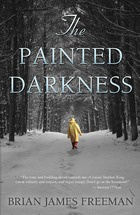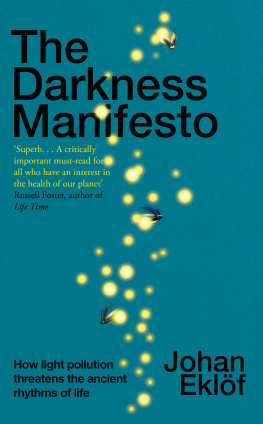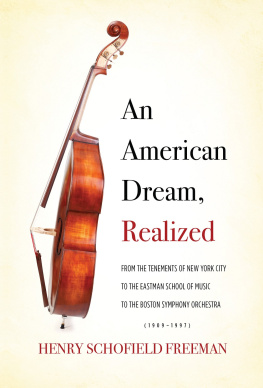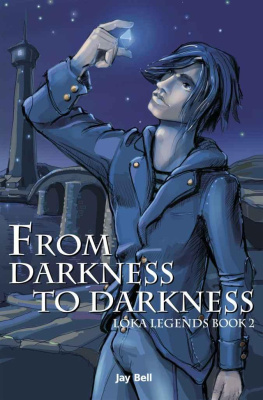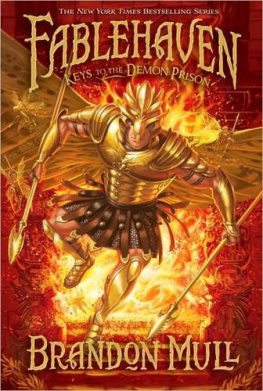THE PAINTED
DARKNESS
Advance Praise for THE PAINTED DARKNESS
"Brian Freeman's evocative tale about the dark corners of an artist's imagination is elegant and haunting. This beautifully designed book with splendid illustrations by Jill Bauman is a pleasure to read and a joy to hold."
--David Morrell, New York Times bestselling author of The Shimmer
"Spooky stuff!"
--Richard Matheson, New York Times bestselling author of What Dreams May Come and I Am Legend
"The tone and building dread reminded me of classic Stephen King. Great velocity and impact, and super creepy. Don't go in the basement!"
--Stewart O'Nan, New York Times bestselling author ofThe Night Country and A Prayer for the Dying "The Painted Darkness is a dark, terrifying, and deeply moving gem of a novella.Brian Freeman managed to both scare me and move me to tears."
--Tess Gerritsen, New York Times bestselling author of The Keepsake
"Wonderfully reminiscent of the quiet horror of Charles L. Grant,The Painted Darkness takes readers on a gently chilly walk through the forest of fears both conscious and subconscious.With Straubian lyricism, Brian Freeman evokes not only the irrational terrors of childhood,but addresses the roots of creativity and the vital importance of art. A very impressive achievement."
--Bentley Little, award-winning author of The House and His Father's Son
THE PAINTED
DARKNESS
BRIAN JAMES FREEMAN
CEMETERY DANCE PUBLICATIONS
Baltimore
2010
Copyright (c) 2010 by Brian James Freeman
A Conversation with Brian James Freeman Copyright (c) 2010
by Norman Prentiss Roundtable Discussion
Copyright (c) 2010 by the respective authors Interview with Ray Bradbury:
"We Have Too Many Inventions!" Copyright (c) 2010 by Jonathan R. Eller
All rights reserved.
No part of this book may be reproduced in any form or by any electronic or mechanical means, including information storage and retrieval systems, without permission in writing from the publisher, except by a reviewer who may quote brief passages in a review.
Cemetery Dance Publications 132-B Industry Lane, Unit #7 Forest Hill, MD 21050
http://www.cemeterydance.com
First PDF Edition
ISBN-13: 978-1-58767-208-8
ISBN-10: 1-58767-208-1
Cover Photograph of the Winter Forest
Copyright (c) 2010 by iStockPhoto.com/AzureLaRoux
Cover photograph of the Boy in the Rain Jacket
Copyright (c) 2010 by iStockPhoto.com/iacovou
Cover Images Assembled by Desert Isle Design
Interior Design by Kate Freeman Design
For Kathryn...
Acknowledgements to come. The world is but a canvas to the imagination.
Henry David Thoreau
A man paints with his brains and not with his hands.
Michelangelo
There was something awesome in the thought of the solitary mortalstanding by the open window and summoning in from the gloom outside the spirits of the nether world.
Sir Arthur Conan Doyle
THE BIRTH OF THE ARTIST (1)
Just start at the beginning,Henry's father once
told him, and the rest will take care of itself. These words of wisdom came during the waning hours of a beautiful March day when Henry was five years old--a day that began with a gift from Mother Nature and ended with the little boy running home as fast as his legs would carry him, bounding through the snowdrifts and dodging the thorny branches lining the path through the woods.
Once inside the safety of his family's home at the end of Maple Lane, Henry fell to the hardwood floor in his bedroom, exhausted, his skin scratched, the wounds burning like they were on fire. His hands were bruised and bloody.
Henry crawled under his bed and closed his eyes and he prayed like he had never prayed before. Not the type of praying he did at bedtime every night as his mother watched, and not the generic prayers he said every week in church with the rest of the congregation. For the first time in his life, he was directing his message straight to God Himself, and Henry's request was simple: please send a mighty angel to undo what had been done.
An hour later, the room grew dark as the sun vanished behind the mountains to the west, but Henry hadn't moved an inch. Exhaustion and fear wouldn't allow him. He still wore his yellow rain slicker; his clothing was soaked in sweat; his face was damp with tears. The snow melting off his winter boots had trickled across the hardwood floor, forming a puddle of dirty water.
Finally, after what felt like an eternity, Henry heard the house's front door open and close. A few minutes passed, but he didn't dare move. He held his breath as he listened to the floorboards creaking through the house. The footsteps stopped outside his room and Henry almost couldn't bring himself to watch as the door swung open.
A pair of heavy work boots crossed the room, every step a dull thud, and Henry let out a small cry. The boots stopped. The man's pants were stained with grease and grime and bleach. He took a knee next to the puddle of melted snow and, after a brief moment, he reached under the bed with his weathered, callused hand.
Henry grabbed onto the giant hand and his father pulled him out in one quick, smooth motion. He hadn't turned the lights on yet, but there was a bright beam of moonlight creeping past the curtains, slicing the bedroom in half. Henry stared into his father's big eyes, which seemed to glow in the sparkling light. His father was a bear of a man, but he gently lifted Henry and sat him on the bed like someone moving the most delicate of antiques. Henry sobbed while his father rocked him in his enormous arms--and for a while, this did nothing to make the little boy feel better.
His father whispered: "It'll be okay, Henry. Just start at the beginning and the rest will take care of itself."
And Henry, still shaking, told his father what had pushed him to the brink of his sanity that beautiful March afternoon: a series of events so terrible he wouldn't allow himself to remember them once he grew up. He did his best to describe what had caused him to run as fast as he could through the woods and to hide under the bed, as if the bed might protect him from the horrors he had witnessed, as if the misery chasing after him wouldn't be able to find him in the dark. As if the monsters would leave him alone there.
"Son," his father said when Henry had finished, "the monsters don't live in the dark corners waiting to pounce on us. They live deep in our heart. But we can fight them. I promise you, we can fight them and we can win."
Henry listened to his father's words, which were soothing and comforting and wise. Then his father suggested he get a piece of paper and some crayons. His father said, "I know something that'll help you feel better."
Henry did as his father instructed, and before the night was over he would be repeating a mantra:
I paint against the darkness.
Those words made Henry feel strong in a way he couldn't describe. The words opened doors within his mind; they set him free and gave him courage to face the night.
But in the end, would that courage and his father's wisdom be enough to truly save Henry from the monsters he feared so much? Or had he just delayed the inevitable?
The answer to those questions wouldn't be determined for another twenty years.
THE PRESENT (1)
The Blank Canvas in the Farmhouse Attic
These days Henry has no memory of the events that led him to hide under his bed when he was five years old and because of that his father's advice has a different meaning for him.
Whenever a blank canvas is staring at Henry, he hears his father say, just start at the beginning and the rest will take care of itself, and then the path into his troubled imagination becomes clear enough for him to paint his demons and worries away. Normally this process is second nature to Henry, like breathing, but today something is wrong.

